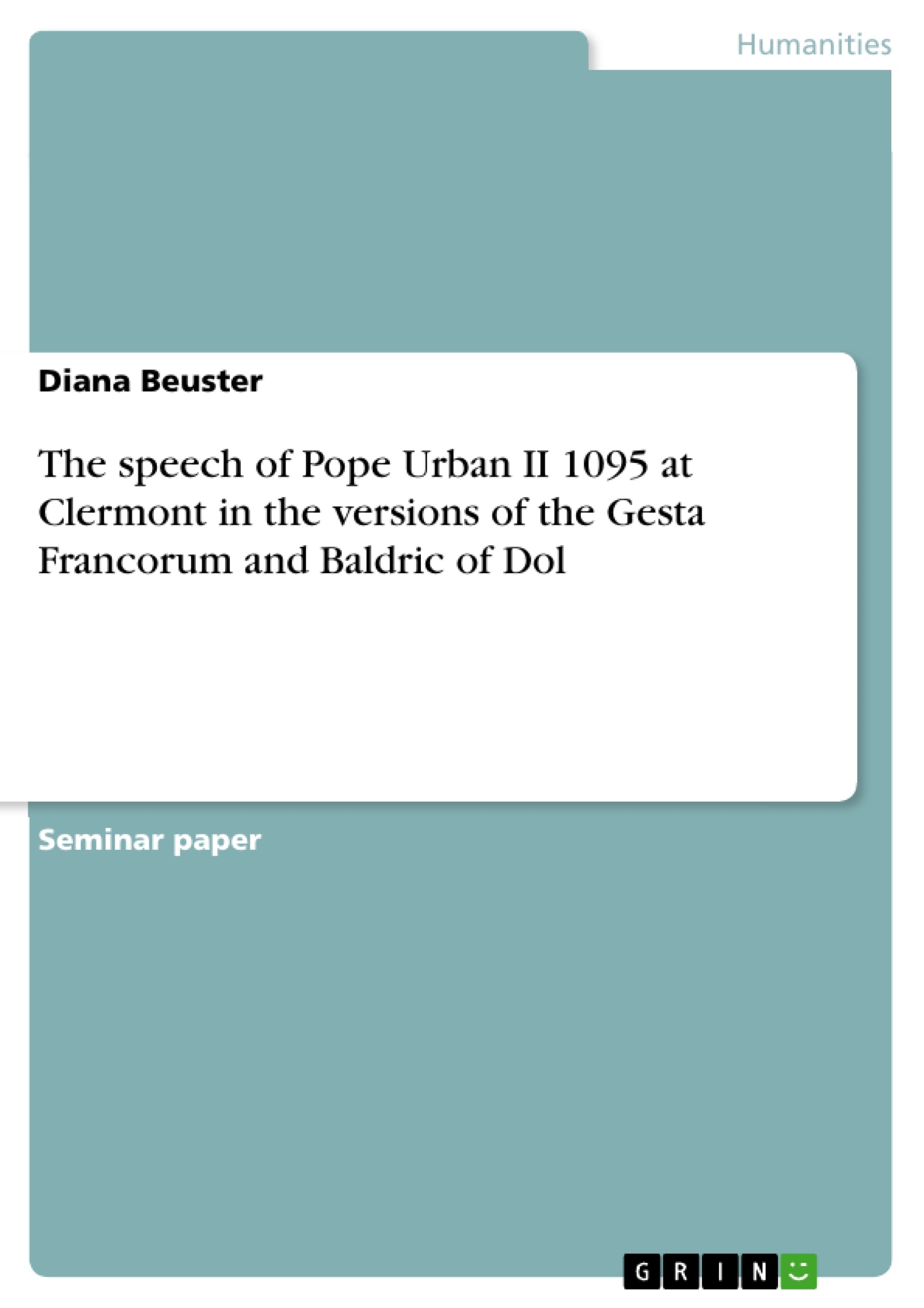At the council of Clermont, a mixed synod of ecclesiastics and laymen of the Catholic Church, Pope Urban II delivered his most famous address which led thousands of knights and ordinary people to take the cross and march to the East, what is considered to be the begin of the Crusades. Several versions of this famous speech have come to us, and among the most important and most cited versions of the speech are the one of Baldric of Dol and the version of the Gesta Francorum by an anonymous author.
By comparing these two versions of the speech we are able to extract the reflections of the speech and the following events by every single author, which is inevitable for answering the question whether the Crusades were a spontaneous response to the Council of Clermont or a long and carefully developed plan for the conquest of the East.
Table of Contents
- The ,,credit\" or the \"blaming” or the responsibility
- The appeal of Urban II was made at a time of political, military and religious changing
- So we have in the 11th century a continuously growing strength of the church and the papacy
- As I mentioned above Odo-Urban was born into a French noble family and therefore he
- The so-called De Gesta Francorum et aliorum Hierosolimitanorum (\"The deeds of the Franks and the other pilgrims to Jerusalem\")
Objectives and Key Themes
This text analyzes the speech of Pope Urban II at the Council of Clermont in 1095, which is widely considered the catalyst for the First Crusade. The author focuses on two primary versions of the speech: the one recorded in the Gesta Francorum and the version by Baldric of Dol. The text aims to understand the historical context surrounding the speech, the motivations behind Urban II's call for a crusade, and the impact of this speech on the subsequent events of the First Crusade.
- The historical context of the First Crusade, including political, military, and religious factors in both Europe and the East.
- The role of Pope Urban II and his relationship with the French aristocracy in initiating the Crusade.
- The different versions of the speech and their significance in understanding the motivations behind the call to arms.
- The impact of the speech on the recruitment of knights and ordinary people for the Crusade.
- The connection between the Crusade and the existing movements of Peace and Truce of God.
Chapter Summaries
- The first chapter focuses on the background of Pope Urban II, highlighting his key contributions to the Gregorian Reforms and his role as a leader within the Church.
- The second chapter delves into the broader historical context surrounding Urban II's appeal, examining factors such as the increased pilgrimage to the East, the Cluniac Reform, and the evolving political situation in Europe.
- The third chapter explores the growing strength of the Church and the papacy in the 11th century, highlighting the significance of the conflict between the German king and the papacy over lay investiture. The chapter also discusses the emergence of the concept of the "milites Christi" and its relation to the idea of a crusade.
- The fourth chapter examines Urban II's connection to the French aristocracy, arguing that his knowledge of their motivations and concerns influenced his call for a crusade.
- The fifth chapter introduces the Gesta Francorum, a key source for understanding the First Crusade, discussing its authorship, composition, and perspective on the events.
Keywords
The key terms and concepts of this text include the First Crusade, Pope Urban II, the Council of Clermont, the Gregorian Reforms, the Cluniac Reform, the Peace and Truce of God movement, the Gesta Francorum, the milites Christi, and the historical context of the 11th century.
Frequently Asked Questions
What was the primary goal of Pope Urban II's speech at Clermont in 1095?
The speech aimed to mobilize knights and commoners to "take the cross" and march to the East, effectively initiating the First Crusade.
What are the main differences between the Gesta Francorum and Baldric of Dol's versions of the speech?
The different versions reflect the authors' unique perspectives and help historians determine if the Crusade was a spontaneous response or a long-developed plan.
How did the Gregorian Reforms impact the initiation of the Crusade?
The reforms strengthened the papacy and its leadership role in Europe, providing Pope Urban II with the authority needed to call for such a massive military undertaking.
What does the term "milites Christi" mean in the context of the 11th century?
It refers to "soldiers of Christ," a concept that evolved during this period to justify the role of the knightly class in fighting for the Church.
What role did the "Peace and Truce of God" movements play?
These movements sought to limit internal violence in Europe, and the Crusade redirected the energy of the warring nobility toward a common external goal in the East.
- Citation du texte
- M.A. Diana Beuster (Auteur), 2006, The speech of Pope Urban II 1095 at Clermont in the versions of the Gesta Francorum and Baldric of Dol, Munich, GRIN Verlag, https://www.grin.com/document/77506



